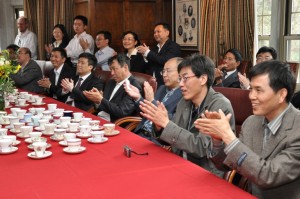
Delegates from the Chinese Academy of Agricultural Sciences (CAAS) have begun a three-month stay at the University of Guelph to learn English, experience Canadian culture and develop research collaborations. U of G held a reception for the delegates May 10.
Now in its third year, the partnership program between the two institutions reflects common research interests in plant and animal sciences. Besides taking English lessons, the delegates will meet with U of G faculty in similar research fields.
Speaking at the reception, Robert Gordon, dean of the Ontario Agricultural College, said: “We appreciate the relationships that have been fostered by our two countries and our two institutions over the past three years. We hope that, when you come here, you benefit from some English-language training but also from the long-term relationships that you are able to create with our faculty, staff and students across the University.”
Working with the University’s ESL instructors, the visitors will speak, listen, read and write in an academic context. They will tour the St. Jacobs Farmers’ Market, Niagara Falls and other attractions.
“It’s very exciting for us to be involved in a project like this,” said Julian Inglis, ESL program manager in the Office of Open Learning. “You all have a very specific academic goal and that is to make research connections here at the University. Our goal is to facilitate those connections. Everything that we do in our English-language instruction is aimed towards those goals.”
The partnership program began after a 2005 visit to the University of Guelph by CAAS president Zhai Huqu.
“They recognized the University of Guelph as being very strong in agriculture,” said Yong-Mei Bi, research manager in the lab of Prof. Steven Rothstein, Department of Molecular and Cellular Biology.
Along with Bi and Rothstein, U of G president Alastair Summerlee visited China in 2008 to sign a memorandum of understanding. The CAAS sent 20 senior scientists to U of G in 2009 and 28 last year. This year, 23 Chinese delegates are visiting U of G.
CAAS consists of 39 institutes and a graduate school. Last year, the academy began a graduate student exchange program in plant genetics; the first Chinese students will arrive at U of G by the end of May.